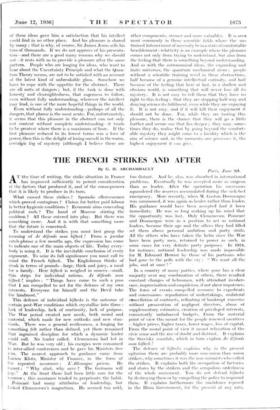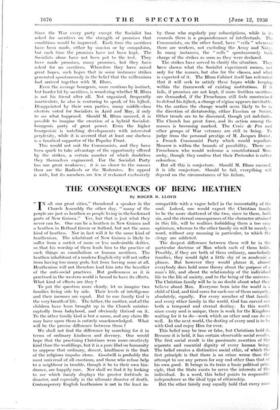THE FRENCH STRIKES AND AFTER
What caused these strikes ? Sporadic effervescence which proved contagious ? - Claims for better paid labour in better hygienic conditions ? Economic aims concealing political ends ? The hand of Moscow stirring the cauldron ? All these entered into play. But there was something more. And it is with that something more that the future is concerned.
To understand the strikes you must first grasp the meaning of Je defends mon bifteck ! From a jocular catch-phrase a few months ago, the expression has come to indicate one of the main objects of life. Today every- body is using it. It is the inevitable conclusion of every argument. To seize its full significance you must call to mind the French bifteck.. The Englishman thinks of steak in terms of pounds—large, thick and juicy, a meal for a family. Here bifteck is weighed in ounces—small, thin strips for individual rations. Je defends mon bifteck! implies : " Things have come to such a pass that I am .compelled to act for the defence of my own interests. Everyone for himself and the Devil take the hindmost."
This .detence of individual biftecks is the outcome of certain post-War conditions which crystallise into three : kick of leadership, lack of continuity, lack of purpose. The War period created new needs, both moral and material, .which made for new outlooks and new stan- dards. There was a general restlessness, a longing for something felt rather than defined, yet there remained that ingrained discipline for which a dynamic leader could call. No leader called. Clemenceau had led in War. But he was very old ; his energies were consumed iii inter-allied conferences and he gave his Ministers free rein. The nearest _ approach to guidance came from Lucien Klotz, Minister of Finance, in the form of the repeated. assurance : L'Allemagne paiera. He Meant : " Why stint, - why save ? The Germans will Pay." At the front there had been little. care for the morrow ;• this assurance tended to perpetuate the habit. ,Poineare had many attributes of leadership, but lacked Clemenceau's magnetism. He seemed too cold, too distant. And he, also, was absorbed in international problems. Eventually he was accepted more as surgeon than as leader. After the operation his successors squandered the reserves accumulated during the sick-bed emergency. More recently, when M. Gaston Douniergue was summoned, it was again as healer rather than leader. His guidance would have been accepted had it been immediate. He was so long making up his mind that the opportunity was lost. Only Clemenecau, Poincar6 and Doumergue were in a position to act as national leaders, because their age and the offices they had filled set them above personal ambition and party strife. All. the others who have taken the helm since the War have been party men, returned to power as such, in some cases for very definite party purpoSes. In 1924, for instance, national leadership was made impossible for M. Edouard Herriot by those of his partisans who had gone to the polls with the cry : " We want all the jobs, and at once ! "
In a country of many parties, where done has a clear majority over any combination of others, there resulted constant changes of helmsmen, with attendant incoher- ence, improvisation and empiricism, if not her impotence. The force of events compelled recourse to expedients and concessions—repudiation of undertakings, unilateral cancellation of contracts, refloating of bankrupt concerns without prosecution of negligent directors, abuse of supplementary estimates, creation of privileged interests, consistently unbalanced budgets. From the material point of view this meant for the people renewed sacrifices —higher prices, higher taxes, lower wages, loss of capital. From the moral point of view it meant relaxation of the civic sense and the rise of doubt and distrust. It explains the Stavisky scandals, which in turn explain Je defends mon bifteck !
The defence of bifterks explains why in the present agitation there- are probably more non-union than union strikers, why sometimes it was the non-unionists who called the -strikes. It explains both the occupation of factories and stores by the strikers and the scrupulous orderliness of the whole movement. You do not defend !ultras by destroying them or by compelling the police to impound them. It explains furthermore. the confulence reposed in the Blum Government, for the present at any rate, Since the War every party except the Socialist has asked for sacrifices on the strength of promises that conditions would be improved. Each time the sacrifices have been made, either by suasion or by compulsion, but each time the promises have not been kept. The Socialists alone have not been put to the test. They have made promises, many promises, but they have asked for no sacrifices. Wherefore they have raised great hopes, such hopes that in some instances strikes generated spontaneously in the belief that the millennium had arrived together with M. Blum.
Even the average bourgeois, more cautious by instinct, but harder hit by sacrifices, is wondering whether M. Blum is not his friend after all. Not organised, frequently inarticulate, he also is venturing to speak of his Ifrifieek. Disappointed by their own parties, many middle-class electors voted for Socialists in April and May, if only to see what happened. Should M. Blum succeed, it is possible to imagine the creation of a hybrid Socialist- bourgeois party of great power. Even the higher bourgeoisie is watching developments with interested perplexity, while it is averred that at least one duchess is a fanatical supporter of the Popular Front.
This would not suit the Communists, and they have been quick to take advantage of the opportunity offered by the strikes, a certain number of which doubtless they themselves engineered. For the Socialist Party has one great weakness ; it is no closer to the masses than arc the Radicals or the Moderates. Its appeal is wide, but its members arc few if reckoned exclusively by . those who regularly pay subscriptions, while in its councils there is a preponderance of intellectuals. The Communists, on the other hand, have ".cells " wherever there are workers, not excluding the Army and Navy. In many instances, the " cells " spOntaneously took charge of the strikes as soon as they were declared.
The strikes have served to clarify the situation. They have shown what the Socialist experiment means, not only for the masses, but also for the classes, and what is expected of it. The Blum Cabinet itself has reiterated that it will seek to satisfy these hopes while keeping within the framework of existing institutions. If it fails, if promises are not kept, if more fruitless sacrifices are demanded, if the Frenchman still feels constrained to defend his bifieek, a change of regime appears inevitable. On the surface the change would seem likely to be in the direction of dictatorship, either Fascism or Soviet. Other trends are to be discerned, though yet indefinite. The Church has great force, and its action among the masses is becoming marked. The Croix de Feu and other groups of War veterans are still in being. To judge from the personal prestige of M. Jacques Doriot, a French Communist Party which would repudiate Moscow is within the bounds of possibility. There are Frenchmen who would welcome a constitutional Mon- archy, though they confess that their Pretender is rather colourless.
But all this is conjecture. Should M. Blum succeed, it is idle conjecture. Should he fail, everything will depend on the circumstances of his failure.























































 Previous page
Previous page